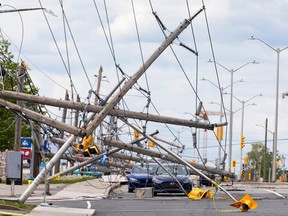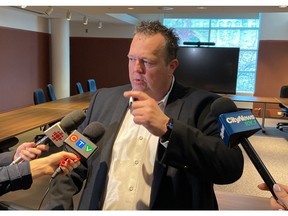
The 2022 derecho continues to cost the City of Ottawa, knocking more than $3 million off the dividend it would have normally received from its utility company, Hydro Ottawa.
“Were it not for the derecho, (the dividend) would have been $23 million,” Hydro Ottawa’s chief executive officer, Bryce Conrad, told reporters after the company’s annual report was delivered to city council Wednesday. “As it stand now, it’s $20 million.”

Article content
Article content
The devastating windstorm on the 2022 Victoria Day weekend pummelled the region with winds of nearly 200 km/h, downing or damaging approximately 400 hydro poles and knocking out power to nearly 200,000 customers, some of whom were left in the dark for nearly two weeks. It was the most damaging storm ever for Hydro Ottawa.
The cleanup and repairs cost Hydro Ottawa $25 million, Conrad said, and, despite all three provincial party leaders assuring former mayor Jim Watson during the 2022 Ontario election campaign that they would help pay for the damage, the company was left on its own to swallow the cost.
“It was an election campaign. All three leaders happened to be around Ottawa. They saw the scale and the scope of the event. Mayor Watson put it to them, ‘Will you keep us whole? Will you help us pay for the damage?’ And all three leaders committed to doing so,” Conrad said.
In the end, however, the Ontario government said the damage didn’t qualify for disaster relief funding. Hydro Ottawa could have applied to the Ontario Energy Board to pass the cost onto its customers, but decided not to do so, Conrad said.
Article content
“People had been out of power for 10, 11, 12 days. It didn’t seem right,” he said. “We’re not going to add salt to the wounds. We’ll just eat that cost.”

While Conrad described Hydro Ottawa’s power grid as “robust,” with one of the highest reliability rates of any utility company in Ontario, he also warned that customers must be ready to cope with long power outages.
“There’s nothing fragile about our infrastructure. The derecho had 195 km/h winds. There’s nothing that will withstand that. That’s not fragility, that’s just God kicking our ass,” he said.
In the span of 12 months, the city endured the derecho, a December “snow bomb” that knocked power out in some areas for two to three days and a late-spring ice storm that left some customers in the dark for another day or two.
“Three multi-day outages in one calendar year. I’m not a forecaster, but I’m thinking, if that’s the past, we should plan for that going forward,” Conrad said.
“I’ll plan for the infrastructure. We’ll do tree-cutting, we’ll bury lines when we can. We’ll protect the lines. There’s lots of things that we can do, but, at the end of the day, the homeowner has to be prepared to go two or three days without power.”
Article content
“Have water, have food for 72 hours. After 72 hours, somebody’s going to be there to help you, whether it will be Hydro and the power comes on, or we’ll have heating stations or food stations set up. Someone will be there to help you. But you need to get through that first 72 hours.”
The Hydro Ottawa annual report was twice delayed because of an 85-day strike by unionized workers. The utility is still assessing how the strike will affect its year-end finances, Conrad said, but the loss of the summer construction season will hurt.
“We’re effectively a large construction company. For every dollar of infrastructure we put in the ground, we earn a rate of return. It was June 26 when the labour disruption started — that’s prime construction season that we lost. So there will be negative impacts financially. But we had to do what we had to do. I’m just happy that they’re back and we can turn the page and move forward.”
Article content


